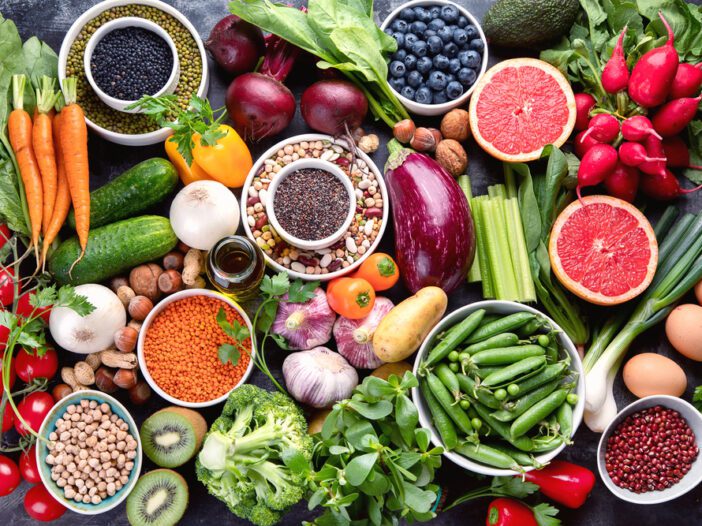
Polycystic ovarian syndrome, or PCOS, is one of the leading causes of infertility in the United States. Unfortunately, it goes largely undiagnosed in teens and young adult women despite some telltale symptoms.
This means young women with PCOS miss out on years of learning how to minimize the symptoms and manage the condition naturally using healthy diet and lifestyle choices.
PCOS Diets Can Minimize Symptoms & Increase Fertility
In addition to having a higher risk of infertility, women with PCOS are also at higher risk for other health conditions such as type 2 diabetes, high blood pressure, and depression. These risks are primarily the result of hormonal imbalances physiologically inherent in the syndrome.
Before we begin outlining PCOS-friendly foods, we want to get the word out as much as possible about common symptoms of PCOS to support earlier diagnosis and treatment, which yields higher fertility chances for patients in the future.
Common symptoms of PCOS
- Thinning hair on the crown of the head (male balding patterns).
- Thicker or darker hair on the face, chest, or back ( facial hair may even include whiskers due to higher-than-normal Androgen levels).
- Skipped periods, or no periods (amenorrhea), Which is always a sign that a woman is not ovulating.
- Carrying excess weight around the middle.
- Difficulty with weight management.
- Mood swings and irritability.
- Sleep disruptions.
There is also an atypical form of PCOS, sometimes referred to as ”skinny PCOS.” However, most women with skinny PCOS still experience skipped or irregular periods. This is why we always say irregular periods are never normal and should be discussed with your OBGYN.
Anti-inflammatory diets include lots of PCOS-friendly foods
Always discuss any significant changes to your diet or lifestyle with your primary care provider or your fertility specialist. However, in almost all cases, they will approve of observing what we refer to as an anti-inflammatory diet.
That said, if you have an existing PCOS diagnosis, your doctor may recommend a modified version of the diet that aligns more with a modified Atkins, modified keto, or other low-carb diet to optimize blood sugar balance and minimize insulin resistance.
Anti-inflammatory diets focus on whole foods, emphasizing lean proteins and lots of fruits and veggies. These diets also include fiber-rich foods because high-fiber foods take longer to digest and help stabilize blood sugar levels. As we mentioned above, type 2 diabetes is commonly associated with women who have PCOS. Insulin is a hormone, and wherever there is an imbalance in one hormone level, it automatically affects hormone imbalance elsewhere, negatively impacting fertility hormone levels.
NOTE: Don’t panic about the word “diet.” You can eat a diverse variety of foods, and there are many creative ways to integrate these ingredients into delicious meals and snacks. We recommend doing online searches for cookbooks focusing on PCOS-friendly recipes or delicious meals for insulin resistance.
Here are some examples of PCOS-friendly foods:
Foods high in Omega-3s
- Olive or avocado oil instead of butter
- Salmon, mackerel, sardines, herring, anchovies (a few times a week from safe sources)
- Flaxseeds & chia seeds (blend in smoothies or sprinkle on cereal or yogurt)
- Walnuts
- Farm fresh eggs
- Beans & legumes
- Supplements (talk to your doctor for personalized recommendations for high-quality products)
Beans & legumes
In addition to being a good source of omega-3 fatty acids, beans and legumes are also an excellent source of protein and fiber. There’s no such thing as a bad edible bean, so start experimenting with the variety of beans available in dry and canned forms to see what you like best.
Non-starchy vegetables
Most women with PCOS minimize starchy vegetables like potatoes and increase their intake of other non-starchy vegetables. Some of the healthiest vegetables that provide the best bang for their Buck are:
- Leafy greens, like kale, Swiss char,d spinach, romaine bok choy, and cabbages.
- Cruciferous vegetables, including cabbages, broccoli, Romanesco cauliflower, and Brussels sprouts.
- Tomatoes
- Fennel
- Celery
- Peppers
- Mushrooms
- Peas and snow peas
- Green beans
Whole grains
If you want to eat bread, pasta, or other starchy processed foods, be conservative. Read the ingredient lists and ensure they use whole-grain flour. Also, keep your eye out for options marked keto-friendly, which inherently include lower-carb ingredients.
Examples of whole grains include:
- Brown rice
- Barley
- Quinoa
- Sorghum
- Bulgur wheat
- Oats
Whole fruits
Whole fruits are precisely that. They aren’t processed into anything else unless it happens to be dried fruit, a fruit-only spread, or 100% fruit juice popsicle (Prioritizing popsicles made from pureed fruit so that all of the fiber is included). Reading labels ensures no extra sugars or carbohydrates are snuck in.
Swapping your typical desserts for those that incorporate whole fruits will support blood sugar balance because fruit is high in fiber, which slows down the rate at which sugar absorbs into your bloodstream.
Keep water as the focus of your hydration
We are very wary of the advice to focus on zero-sugar drinks. This is because much research has come out about how these drinks may not be as safe as we think. Also, the body can have a blood sugar spike even with artificial sugar ingredients.
Instead, we recommend keeping good old-fashioned water as the centerpiece of hydration. Fruit, veggie, and herb-infused water are healthy options.
RRC supports patients with PCOS-friendly lifestyle recommendations
Working with a fertility specialist who takes a big-picture approach, placing an emphasis on lifestyle recommendations that support fertility success, can make all the difference.
If you are struggling to get pregnant or ready to approach fertility treatments with a holistic perspective, schedule a consultation with the Reproductive Resource Center.
 Patient Portal
Patient Portal